九年级英语第二单元英语知识点总结
九年级上册英语第二单元知识点
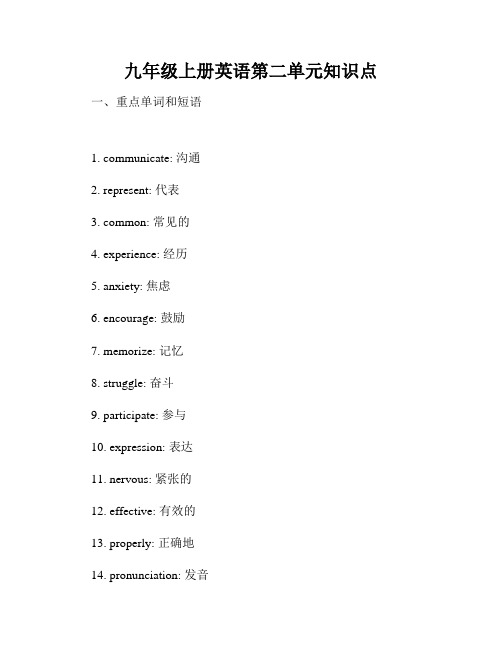
九年级上册英语第二单元知识点一、重点单词和短语1. communicate: 沟通2. represent: 代表3. common: 常见的4. experience: 经历5. anxiety: 焦虑6. encourage: 鼓励7. memorize: 记忆8. struggle: 奋斗9. participate: 参与10. expression: 表达11. nervous: 紧张的12. effective: 有效的13. properly: 正确地14. pronunciation: 发音15. progress: 进步二、重点语法1. 一般现在时:表示经常性、习惯性的动作或事实。
例如:She always gets up early.2. 现在进行时:表示现在进行的动作。
例如:They are playing basketball now.3. 一般过去时:表示过去发生的动作或状态。
例如:I saw a movie yesterday.4. 过去进行时:表示过去某一时刻正在进行的动作。
例如:She was studying when I called her.5. 一般将来时:表示将来要发生的动作或事件。
例如:We will visit Beijing next month.三、重点句型1. How do you communicate with your friends?你是如何与你的朋友沟通的?2. I usually talk to them on social media.我通常在社交媒体上与他们交谈。
3. English is important for communication.英语对于沟通来说很重要。
4. I have some experience in learning English.我在学习英语方面有一些经验。
5. Don't be nervous and just enjoy the process.不要紧张,尽情享受这个过程。
英语九年级全一册Unit2知识点

英语九年级全一册Unit2知识点Unit2是英语九年级全一册系列中的一个单元,着重讲解了一些重要的语法知识和词汇。
在本文中,我们将就该单元的一些重要知识点进行详细介绍。
一、动词的过去分词形式在Unit2的学习中,我们需要掌握动词的过去分词形式,因为它们在完成时态、被动语态等语法结构中起到关键作用。
动词的过去分词形式通常是加上ed、d或了的。
例如:1. play——played(玩——玩过)2. watch——watched(看——看过)3. do——done(做——做过)值得注意的是,也有些动词的过去分词形式要变化,需要特别记忆。
例如:1. go——gone(去——去过)2. eat——eaten(吃——吃过)二、目的状语从句Unit2中还介绍了目的状语从句的用法。
目的状语从句用来表示目的或意图,通常由连接词"so that"或"in order that"引导。
例如:1. He studies hard so that he can get good grades.(他努力学习,以便能取得好成绩。
)2. They saved money in order that they could go on a trip.(他们存钱以便能去旅行。
)目的状语从句在句子中起到修饰作用,使句子意思更加明确。
三、情态动词Unit2还介绍了一些情态动词的用法,如can、could、may、might、shall、should、will、would等。
情态动词在句子中表示说话人的意愿、推测、建议、允诺等情态。
例如:1. You should study hard for the exam.(你应该为考试努力学习。
)2. They may go to the park tomorrow.(他们可能明天去公园。
)情态动词在句子中的具体用法需要根据具体语境来理解和掌握。
四、描写性形容词和描写性副词在Unit2的学习中,我们还需要掌握描写性形容词和描写性副词的用法。
最全面人教版九年级全册英语第二单元知识点归纳总结
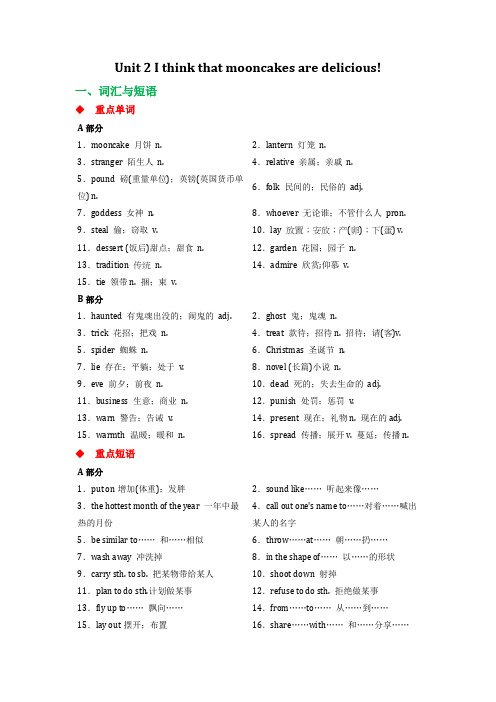
Unit 2 I think that mooncakes are delicious!一、词汇与短语◆重点单词A部分1.mooncake 月饼n.2.lantern 灯笼n.3.stranger 陌生人n.4.relative 亲属;亲戚n.5.pound 磅(重量单位);英镑(英国货币单位) n.6.folk 民间的;民俗的adj. 7.goddess 女神n.8.whoever 无论谁;不管什么人pron. 9.steal 偷;窃取v.10.lay 放置;安放;产(卵);下(蛋) v. 11.dessert (饭后)甜点;甜食n.12.garden 花园;园子n. 13.tradition 传统n.14.admire 欣赏;仰慕v.15.tie 领带n. 捆;束v.B部分1.haunted 有鬼魂出没的;闹鬼的adj.2.ghost 鬼;鬼魂n.3.trick 花招;把戏n.4.treat 款待;招待n. 招待;请(客)v. 5.spider 蜘蛛n.6.Christmas 圣诞节n.7.lie 存在;平躺;处于v.8.novel (长篇)小说n.9.eve 前夕;前夜n.10.dead 死的;失去生命的adj. 11.business 生意;商业n.12.punish 处罚;惩罚v.13.warn 警告;告诫v.14.present 现在;礼物n. 现在的adj. 15.warmth 温暖;暖和n.16.spread 传播;展开v. 蔓延;传播n.◆重点短语A部分1.put on增加(体重);发胖2.sound like……听起来像……3.the hottest month of the year 一年中最热的月份4.call out one's name to……对着……喊出某人的名字5.be similar to……和……相似6.throw……at……朝……扔……7.wash away 冲洗掉8.in the shape of……以……的形状9.carry sth. to sb. 把某物带给某人10.shoot down 射掉11.plan to do sth.计划做某事12.refuse to do sth. 拒绝做某事13.fly up to……飘向……14.from……to……从……到……15.lay out摆开;布置16.share……with……和……分享……17.come/be/get back 回来18.give sth. to sb. 给某人某物19.take sb. out for dinner 带某人出去吃晚饭20.help (to) do sth. /help with sth. 帮助做某事B部分1.dress up打扮;装扮2.trick or treat 不招待就使坏3.learn about 了解4.think of/think about 想到;考虑5.the true meaning of………的真正意义6.the importance of…………的重要性7.a novel written by…………写的小说8.care about 关心9.used to do sth. 过去常常做某事10.warn sb. to do sth. 告诫某人去做某事11.end up最终成为;最后处于12.expect sb. to do sth. 期待某人做某事13.take sb. back to sp. 把某人带回到某地14.wake up 醒来15.remind sb. of sth. /sb.使某人想起某物/16.decide to do sth. 决定做某事某人17.change one's life改变某人的生活18.promise to do sth. 承诺做某事19.in need需要20.treat sb. with……用……招待某人21.the beginning of…………的开端22.give birth to life 孕育新生命23.a symbol of…………的象征24.not only…but also…不但…而且…25.spread……around 到处传播……26.give out 分发◆重点句子A部分1.比尔想知道他们明年是否可以再吃到粽子。
九年级英语unit2知识点总结

九年级英语unit2知识点总结九年级英语Unit 2知识点总结Unit 2是九年级英语中的一单元,内容主要包括一些日常生活中的常用英语表达和语法知识。
在这个单元里,我们将学习如何描述人物、事物以及地点,并且掌握一些重要的语法规则,比如名词的用法、形容词和副词的比较级和最高级等。
一、描述人物在Unit 2中,我们学习了如何用英语来描述人物。
要描述一个人,我们可以用外貌特征、性格特点、兴趣爱好等方面的词汇来进行描绘。
例如:1. 外貌特征:He has short black hair and wears glasses.(他有短发,戴眼镜。
)She is tall and has blue eyes.(她个子高,眼睛是蓝色的。
)2. 性格特点:He is kind and helpful.(他很友善,乐于助人。
)She is shy but very smart.(她很害羞,但非常聪明。
)3. 兴趣爱好:He enjoys playing basketball in his free time.(他喜欢在空闲时间打篮球。
)She loves reading and writing stories.(她喜欢阅读和写故事。
)二、描述事物除了描述人物,我们还可以用英语来描述事物。
在Unit 2中,我们学习了如何用形容词来描述事物的特征、颜色和大小。
例如:1. 特征描述:The car is fast and comfortable.(这辆车开起来快速又舒适。
)The house is big and spacious.(这个房子很大、宽敞。
)2. 颜色描述:Her dress is blue and beautiful.(她的裙子是蓝色的,很漂亮。
)The flowers in the garden are red and vibrant.(花园里的花是红色的,很鲜艳。
)3. 大小描述:The laptop is small and lightweight.(这台笔记本电脑小巧轻便。
九年级英语2单元知识点总结

九年级英语2单元知识点总结一、重点单词。
1. used to.- 用法:used to + 动词原形,表示过去常常做某事,暗指现在不做了。
例如:I used to play football every day after school, but now I'm too busy.(我过去放学后每天都踢足球,但现在我太忙了。
)- 否定形式:didn't use to或used not to。
例如:He didn't use to like reading. = He used not to like reading.(他过去不喜欢阅读。
)- 一般疑问句形式:e to...?或Used...to...? 例如:Did you use to be afraid of the dark? = Used you to be afraid of the dark?(你过去害怕黑暗吗?)2. dark.- 词性:形容词,意为“黑暗的;昏暗的”;名词,意为“黑暗;暗处”。
例如:It's too dark in this room.(这个房间太暗了。
);Cats can see clearlyin the dark.(猫在黑暗中能看得很清楚。
)3. spider.- 词性:名词,意为“蜘蛛”。
复数形式为spiders。
例如:There is a spider on the wall.(墙上有一只蜘蛛。
)4. insect.- 词性:名词,意为“昆虫”。
例如:Ants are very small insects.(蚂蚁是非常小的昆虫。
)5. terrify.- 词性:动词,意为“使害怕;使恐惧”。
常见搭配:terrify sb.例如:The loud noise terrified the baby.(巨大的噪音吓坏了婴儿。
)- 形容词形式:terrified(感到害怕的,用来形容人)和terrifying(令人害怕的,用来形容事物)。
九年级英语知识点第二单元

九年级英语知识点第二单元第二单元: 九年级英语知识点1. 时态与语态 (Tenses and Voice)在英语语法中,动词时态和语态的正确运用是非常重要的。
以下是九年级学生在第二单元应该了解的时态和语态知识点:1.1 一般现在时 (Simple Present Tense)一般现在时用于表示经常性或普遍性的动作、情况或习惯。
它的结构是“主语 + 动词原形”。
例句:- She plays the piano every day. (她每天弹钢琴。
)- They live in a big house. (他们住在一所大房子里。
)1.2 一般过去时 (Simple Past Tense)一般过去时用于表示过去某个时间发生的动作或状态。
它的结构是“主语 + 动词过去式”。
例句:- He studied English last night. (他昨晚学习了英语。
)- We went to the beach last summer. (去年夏天我们去海滩了。
)1.3 一般将来时 (Simple Future Tense)一般将来时用于表示将来发生的动作或情况。
它的结构是“主语 + will + 动词原形”。
例句:- I will visit my grandparents this weekend. (这个周末我会去看望我的祖父母。
)- They will have a party for their anniversary. (为了他们的周年纪念,他们将会举办一个聚会。
)1.4 现在进行时 (Present Continuous Tense)现在进行时用于表示现在正在进行的动作。
它的结构是“主语 + am/is/are + 动词的ing形式”。
例句:- She is studying for her exam at the moment. (她此刻正在为考试而学习。
)- They are playing soccer in the park. (他们正在公园里踢足球。
九年级英语第二单元知识点

九年级英语第二单元知识点(原创实用版)目录1.概述九年级英语第二单元知识点2.名词性从句3.动词的时态和语态4.情态动词5.代词的用法6.介词和连词7.句子结构和语法规则正文一、概述九年级英语第二单元知识点九年级英语第二单元的知识点主要包括名词性从句、动词的时态和语态、情态动词、代词的用法、介词和连词以及句子结构和语法规则等。
这些知识点是英语学习中至关重要的部分,掌握这些知识点能够帮助学生更好地理解和运用英语语言。
二、名词性从句名词性从句是九年级英语中的一个重要知识点。
它主要包括宾语从句、主语从句、表语从句和同位语从句等。
在学习名词性从句时,学生需要掌握从句的引导词、从句的语序以及从句与主句之间的关系。
三、动词的时态和语态动词的时态和语态是英语语法中的基本概念。
九年级英语第二单元涉及到的一般现在时、一般过去时、一般将来时、现在进行时、过去进行时、将来进行时等时态,以及主动语态、被动语态等语态,学生需要熟练掌握各种时态和语态的构成及其用法。
四、情态动词情态动词是表示可能性、能力、许可、建议等意义的动词,如 can、may、must 等。
学生需要了解情态动词的用法,以及情态动词后接动词原形的规则。
五、代词的用法代词是代替名词、数词、形容词等词类的词。
九年级英语第二单元涉及到的人称代词、物主代词、指示代词、疑问代词等,学生需要掌握代词的用法和替换规则。
六、介词和连词介词和连词是英语中不可或缺的词类。
学生需要了解介词的用法,如时间介词、地点介词、方向介词等;同时,掌握连词的用法,如并列连词、从属连词等。
七、句子结构和语法规则九年级英语第二单元的句子结构和语法规则包括简单句、复合句、并列句、主从句等。
学生需要了解各种句子结构的构成,以及句子成分的搭配和功能。
总之,九年级英语第二单元的知识点涵盖了多个方面,掌握这些知识点对学生的英语学习具有重要意义。
九年级英语Unit2知识点汇总

适用精选文件资料分享九年英 Unit 2 知点九年英 Unit 2知点一、要点短 the Lantern Festival元宵the Dragon Boat Festival端午the Water Festival水eat five meals a day一天吃五餐put on five pounds体重增添了五磅lose weight减肥in two weeks两礼拜此后be similar to...与.......相似throw water at each other相互水in the shape of...呈⋯的形状folk stories民故事lay out 开 ; 部署the story of Chang,e 嫦娥的故事refuse to do sth拒做某事have good luck in the new year在新的一年里有好运气end up 最成 ; 最后于 end up with以⋯束share sth with sb与⋯分享⋯as a result果one ... the other... (二者中 ) 一个⋯另一个⋯care about关怀 20. dress up装打扮haunted house 鬼屋play a trick on sb.捉弄某人give out 分 give up放弃trick or treat (万圣用)不糖果就蛋light candlesthe importance of⋯的重要性take sb around ⋯=show sb around ⋯某人到逛逛warn sb to do sth.警告某人做某事warn sb not to do sth警告某人不要做某事适用精选文件资料分享the beginning of new life重生命的开始remind sb of⋯使某人回想起⋯promise to do sth.承做某treat sb. with.用/以⋯待某人二、要点知点用法n.陌生人=strange(adj) + (e)r【拓展】异人 , 外处人 , 新来者I am a stranger here.我不是当地人.2.put on用法增添体重 ; 胖;穿上,戴上((作);演出,.put on的其余含:①穿上;戴上 My mother put on her coat and went out.②演出; One summer our children put on a play.3. steal用法vt., 盗取 stole ―stolen ;steal sth. from sb./sw.从某人或某地某物y out用法lay out开,部署lay out sth in sw将某物放在某lay v. 部署 , 部署 ,卵 , 下蛋 laid laidlie平躺 lay lainlie撒 lied lied5. admire用法vt. 欣 , 仰募 + sb./sth admire sb./sth for (doing)sth某事而恭敬 / 欣某人因( 做) 6. trick or treattrick n.把戏, treat用法:把不客就蛋play atrick on sb.捉弄某人n.款待, 款待v.款待, 客It’s my treat.我客treat sb. to sth某人吃⋯对待 ; 看作与 as 用treat ⋯ as ⋯把 .. 看作治 Which doctors are treating him for his illness.某人治7. punish 用法v.,be punished for因⋯受n. punishment adj. punishable的 , 可依法的8. warn 用法v警告, 告1)warn sb (not) to do sth.警告 , 告某人做某事2)warn sb. about sth .提示 / 告某人注意某事3)warn sb. of/ against (doing) sth .告某人防备某事4)warn (sb.)that从句9.dead 用法是形容,意“死的;失掉生命的”,常用于名前定或作系的表。
九年级英语第二单元知识点归纳总结
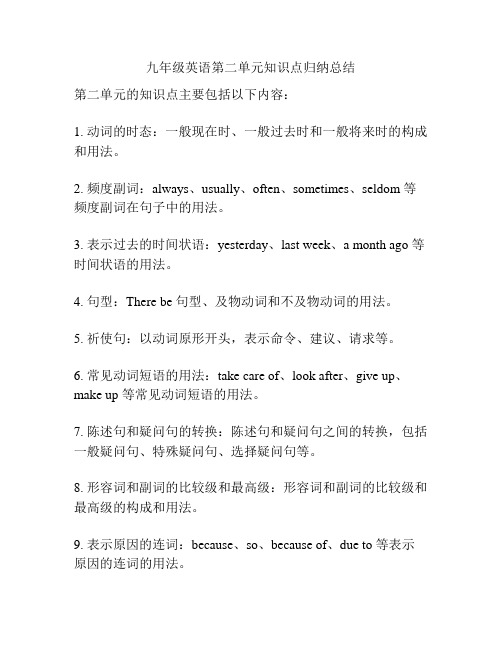
九年级英语第二单元知识点归纳总结
第二单元的知识点主要包括以下内容:
1. 动词的时态:一般现在时、一般过去时和一般将来时的构成和用法。
2. 频度副词:always、usually、often、sometimes、seldom 等频度副词在句子中的用法。
3. 表示过去的时间状语:yesterday、last week、a month ago 等时间状语的用法。
4. 句型:There be 句型、及物动词和不及物动词的用法。
5. 祈使句:以动词原形开头,表示命令、建议、请求等。
6. 常见动词短语的用法:take care of、look after、give up、make up 等常见动词短语的用法。
7. 陈述句和疑问句的转换:陈述句和疑问句之间的转换,包括一般疑问句、特殊疑问句、选择疑问句等。
8. 形容词和副词的比较级和最高级:形容词和副词的比较级和最高级的构成和用法。
9. 表示原因的连词:because、so、because of、due to 等表示原因的连词的用法。
10. 句子的主谓一致:句子中主语和谓语动词在人称和数量上的一致。
以上是九年级英语第二单元的主要知识点总结,希望对你有帮助!。
九年级英语Unit2知识点总结

九年级英语Unit2知识点总结1. used to do sth. 过去常常做某事否定形式:didn’t use to do sth. / used not to do sth.如:He used to play football after school. 放学后他过去常常踢足球。
Did he use to play football? Yes, I did. No, I didn’t.He didn’t use to smoke. 他过去不吸烟。
2. 反意疑问句①肯定陈述句+否定提问如:Lily is a student, isn’t she?Lily will go to China, won’t she?②否定陈述句+肯定提问如:She doesn’t come from China, does she?You haven’t finished homework, have you?③提问部分用代词而不用名词Lily is a student, isn’t she?④陈述句中含有否定意义的词,如:little, few, never, nothing, hardly等。
其反意疑问句用肯定式。
如:He knows little English, does he?他一点也不懂英语,不是吗?They hardly understood it, did they?他们几乎不明白,不是吗?3. play the piano弹钢琴4. ①be interested in sth. 对…感兴趣②be interested in doing sth. 对做…感兴趣如:He is interested in math, but he isn’t interested in speaking English. 他对数学感兴趣,但是他对说英语不感兴趣。
5. interest ed adj. 感兴趣的,指人对某事物感兴趣,往往主语是人interest ing adj.有趣的,指某事物/某人具有趣味,主语往往是物6. still 仍然,还用在be动词的后面如:I’m still a student.用在行为动词的前面如:I still love him.7. the dark 天黑,晚上,黑暗8. 害怕…be terrified of sth.如:I am terrified of the dog.be terrified of doing sth.如:I am terrified of speaking.9. on 副词,表示(电灯、电视、机械等)在运转中/打开,其反义词off. with the light on 灯开着10. walk to somewhere 步行到某处walk to school 步行到学校11.spend 动词,表示“花费金钱、时间”①spend…on sth. 在某事上花费(金钱、时间)②spend…doing sth.花费(金钱、时间)去做某事如:He spends too much time on clothes. 他花费太多的时间在衣着He spend 3 months building the bridge.他花费了三个月去建这座桥。
九年级英语Unit 2重点知识归纳
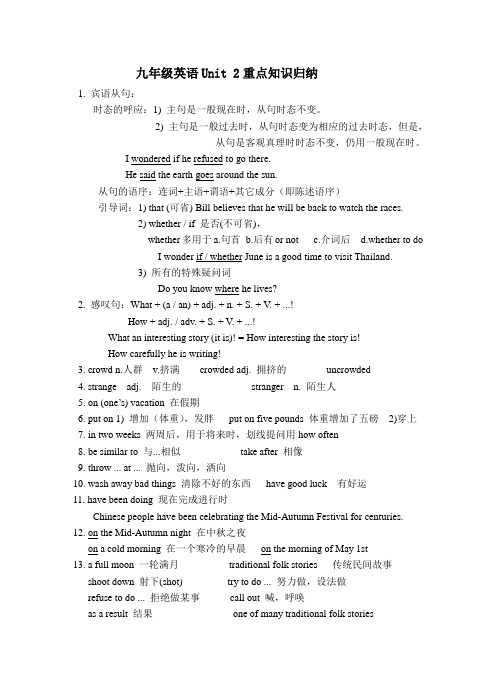
九年级英语Unit 2重点知识归纳1. 宾语从句:时态的呼应:1) 主句是一般现在时,从句时态不变。
2) 主句是一般过去时,从句时态变为相应的过去时态,但是,从句是客观真理时时态不变,仍用一般现在时。
I wondered if he refused to go there.He said the earth goes around the sun.从句的语序:连词+主语+谓语+其它成分(即陈述语序)引导词:1) that (可省) Bill believes that he will be back to watch the races.2) whether / if 是否(不可省),whether多用于a.句首b.后有or not c.介词后 d.whether to doI wonder if / whether June is a good time to visit Thailand.3) 所有的特殊疑问词Do you know where he lives?2. 感叹句:What + (a / an) + adj. + n. + S. + V. + ...!How + adj. / adv. + S. + V. + ...!What an interesting story (it is)! = How interesting the story is!How carefully he is writing!3. crowd n.人群v.挤满crowded adj. 拥挤的uncrowded4. strange adj. 陌生的stranger n. 陌生人5. on (one’s) vacation 在假期6. put on 1) 增加(体重),发胖put on five pounds 体重增加了五磅2)穿上7. in two weeks 两周后,用于将来时,划线提问用how often8. be similar to 与...相似take after 相像9. throw ... at ... 抛向,泼向,洒向10. wash away bad things 清除不好的东西have good luck 有好运11. have been doing 现在完成进行时Chinese people have been celebrating the Mid-Autumn Festival for centuries. 12. on the Mid-Autumn night 在中秋之夜on a cold morning 在一个寒冷的早晨on the morning of May 1st13. a full moon 一轮满月traditional folk stories 传统民间故事shoot down 射下(shot) try to do ... 努力做,设法做refuse to do ... 拒绝做某事call out 喊,呼唤as a result 结果one of many traditional folk storieslay out 摆开,布置fly to 飞向,坐飞机去... (flew)give sth. to sb. = give sb. sth. *give it to himadmire the moon 赏月at night one night 一天晚上14. They carry people’s wishes to the families (they love and miss). (定语从句)他们把人们的祝愿带给自己喜爱和思念的家人。
人教版九年级英语unit2知识归纳

人教版九年级英语unit2知识归纳人教版九年级英语unit2知识1Mooncake['mu:nke?k]n.月饼lantern[?l?nt?(r)n]n.灯笼stranger[?streind??(r)]n.陌生人relative[?rel?tiv]n.亲属;亲戚puton增加(体重);发胖pound[paund]n.磅(重量单位);英镑folk[f?uk]adj.民间的;民俗的goddess[?g?des][?ɡɑd?s]n.女神whoever[hu:?ev?pron.无论是谁;不管谁;任何人steal[sti:l]v.(stole[st?ul],stolen[st?ul?n])偷;窃取lay[lei]v.(laid[leid],laid)放置;产(卵)layout摆开;布置dessert[di?z?:(r)t]n.(饭后)甜点;甜食garden[ga:(r)dn]n.花园;园子tradition[tr??d??n]n.传统admire[?d?mai?(r)]v.欣赏;仰慕tie[tai]n.领带v.捆;束haunted[?h?:ntid]adj.有鬼魂出没的ghost[g?ust]n.鬼;鬼魂trick[trik]n.花招;把戏treat[tri:t]n.款待;招待;请客spider[?spaid?r)]n.蜘蛛Christmas[?krism?s]n.lie[laI]v.(lay[leI],lain[leIn])存在;平躺;处于novel[?n?vl][?na:vl]n.(长篇)小说eve[i:v]n.(尤指宗教节假日的)前夕;前夜dead[ded]adj.死的;失去生命的business[?bizn?s]n.生意;商业punish[?p?nis]v.处罚;惩罚warn[w?:(r)n]v.警告;告诫endup最终成为;最后处于present[preznt]n.现在;礼物adj.现在的nobody[n?ub?di][n?uba:di]pron.没有人warmth[w?:(r)mθ]n.温暖;暖和spread[spred]v.传播;展开n.蔓延;传播Macao[m??kau]澳门ChiangMai[?t?i?n?maI],[d?a:nmaI]清迈(泰城市)WaterFestiwal泼水节Mid-AutumnMother'sDayFather'sDayHalloween[?h?l?u?i:n]前夕AChristmasCarol《圣诞欢歌》(小说名)Easter复活节Clara[?kla:r?][?kler?]克拉拉(女名)Santa[?s?nt?]Claus[kl?:z]圣诞老人Charles[t?a:(r)lz]Dickens[?dik?nz]查尔斯?狄更斯(英)Scrooge[skru:d?]斯克鲁奇n.(非正式)吝啬鬼Jacob[?d?eik?b]Marley[?ma:(r)li]雅各布?马利人教版九年级英语unit2知识2知识梳理【重点】1.puton增加(体重);发胖2.careabout关心;在乎endup最终成为,最后处于notonly……butalso……不但……而且……5.shootdown射下edtodo过去常常做……7.remindsb.of使某人想起8.giveout分发发放thewaterfestival泼水节theChinesespringfestival中国11.nextyear明年12.soundlike听起来像13.eachother互相彼此19.asaresult结果因此20.Mother’sday母亲节21.moreandmorepopular越来越受欢迎22.thinkof想起;认为;思考dressup装扮穿上盛装theimportanceof……的重要性25.makemoney挣钱26.inneed需要帮助处于困境中27.between…and…在……和……之间28.thedragonboatfestival龙舟节29.thelanternfestival30.likebest最喜欢31.goto…foravacation去……度假32.besimilarto与……相似washaway冲走洗掉Mid-autumnfestival中秋节35.shootdown射下36.callout大声呼喊37.thetraditionof……的传统38.atnight在夜里;在晚上one…,theother…一个……,另一个…...Father’sday父亲节【重点句型】1.Ithinkthatthey’refuntowatch.我认为它们看着很有意思。
九年级英语Unit2知识点:第二单元

九年级英语Unit2知识点:第二单元知识点对朋友们的学习非常重要,大家一定要认真掌握,为大家整理了九年级英语Unit2知识点:第二单元,让我们一起学习,一起进步吧! 1. used to do sth. 过去常常做某事 否定形式: didn’t use to do sth. / used not to do sth. 如:He used to play football after school. 放学后他过去常常踢足球。
Did he use to play football? Yes, I did. No, I didn’t. He didn’t use to smoke. 他过去不吸烟。
2. 反意疑问句 ①肯定陈述句+否定提问 如:Lily is a student, isn’t she? Lily will go to China, won’t she? ②否定陈述句+肯定提问如: She doesn’t come from China, does she? You haven’t finished homework, have you? ③提问部分用代词而不用名词Lily is a student, isn’t she? ④陈述句中含有否定意义的词,如:little, few, never, nothing, hardly等。
其反意疑问句用肯定式。
如: He knows little English, does he? 他一点也不懂英语,不是吗? They hardly understood it, did they?他们几乎不明白,不是吗? 3. play the piano 弹钢琴 4. ①be interested in sth. 对…感兴趣 ②be interested in doing sth. 对做…感兴趣 如:He is interested in math, but he isn’t interested in speaking。
人教版九年级全一册英语Unit2单元语法知识点总结
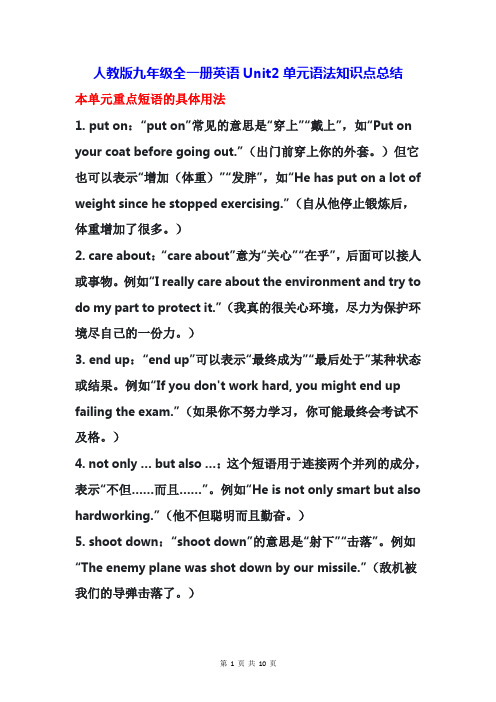
人教版九年级全一册英语Unit2单元语法知识点总结本单元重点短语的具体用法1. put on:“put on”常见的意思是“穿上”“戴上”,如“Put on your coat before going out.”(出门前穿上你的外套。
)但它也可以表示“增加(体重)”“发胖”,如“He has put on a lot of weight since he stopped exercising.”(自从他停止锻炼后,体重增加了很多。
)2. care about:“care about”意为“关心”“在乎”,后面可以接人或事物。
例如“I really care about the environment and try to do my part to protect it.”(我真的很关心环境,尽力为保护环境尽自己的一份力。
)3. end up:“end up”可以表示“最终成为”“最后处于”某种状态或结果。
例如“If you don't work hard, you might end up failing the exam.”(如果你不努力学习,你可能最终会考试不及格。
)4. not only … but also …:这个短语用于连接两个并列的成分,表示“不但……而且……”。
例如“He is not only smart but also hardworking.”(他不但聪明而且勤奋。
)5. shoot down:“shoot down”的意思是“射下”“击落”。
例如“The enemy plane was shot down by our missile.”(敌机被我们的导弹击落了。
)6. used to do:“used to do”表示过去常常做某事,但现在不再这样做了。
例如“I used to play basketball every day, but now I don't have time for it.”(我过去常常每天打篮球,但现在没有时间了。
九年级英语第二单元知识点

九年级英语第二单元知识点摘要:一、九年级英语第二单元核心词汇解析1.单词及短语2.语法点3.句型结构二、重点句子及用法讲解1.日常交流句型2.语法例句三、单元综合练习与解析1.听力练习2.选择题3.填空题4.写作练习正文:一、九年级英语第二单元核心词汇解析1.单词及短语本单元涵盖了多个实用且具有代表性的单词和短语,例如:- native(本土的,天生的)- countryside(乡村,农村)- culture(文化)- tradition(传统)- festival(节日)- cuisine(美食)2.语法点本单元的语法点主要包括一般现在时、一般过去时和一般将来时。
通过本单元的学习,学生将更好地掌握动词时态的用法。
3.句型结构本单元的重点句型结构包括:- 询问来自哪里的疑问句:Where are you from?- 介绍自己所在城市的句子:I come from a small town/city.- 谈论某个国家或地区的特点:China has a rich culture and diverse landscape.二、重点句子及用法讲解1.日常交流句型- A: Where are you from?B: I come from China.2.语法例句- She studies English in her spare time.(她业余时间学习英语。
)- They visited the Great Wall last year.(他们去年参观了长城。
)- We will have a picnic in the countryside this weekend.(我们周末将在乡村野餐。
)三、单元综合练习与解析1.听力练习建议学生多听英语歌曲、新闻、电影等,提高听力水平。
2.选择题提供一些与本单元知识点相关的选择题,让学生自我检测。
3.填空题设计一些填空题,让学生运用本单元的单词和短语进行填空。
九年级英语第二单元英语知识点总结

九年级英语第二单元英语知识点总结Unit 2 I think that mooncakes are delicious!在书中找到相应的语句并写在短语的后面一、重点短语1.What a great day! 多么好的一天!P92.be crowded with 挤满P93.eat out 出去吃饭P104.put on 增加体重P105.be going to 将要做…P106.from…to…从…到…P107.be similar to…与…相似P108.throw at 向…扔去P109.wash away 冲走P1010.have a good luck 祝好运P1011.in the shape of 以…形状P1112.shot down 射落P1113.plan to do 计划做某事P1114.try to do 努力做某事P1115.refuse to do 拒绝做某事P1116.fly up飞向P1117.call out 出动;召集;大声呼喊P11y out 摆开;布置P1119.share …with 与…分享P1120.as a result 结果P1121.dress up as 盛装打扮成P1322.haunted house 鬼屋P1323.trick or treat 不招待就使坏P1324.ask for 要求P1325.play a trick on sb 对某人恶作剧P1326.think of 想到P1427.care about 关心P1428.make money 赚钱P14ed to do 过去曾经P1430.warn sb to so sth 警告某人做某事P1431.end up 最终成为P1432.expect to do 期待做某事P1433.remind of 提醒P1434.take sb to do 带某人去做某事P1435.wake up 醒来P1436.find out 发现;找出P1437.decide to do 决定做某事P1438.promise to do sth 承诺做某事P1439.in need 需要P1440.treat sb with 用…招待某人P1441.the beginning of …的开始P1642.give birth to 生(孩子)P1643.spread…around P1644.give out 分发P16二、重点句型1.what a\an + adj.+ n.+主语+谓语!2.how + adj.+主语+谓语!3.whether\if 引起的宾语从句4.have\has been doing 现在完成进行时5.so…that…句型6.one…, the other….7.more and more +adj. 比较级+比较级8.it is + adj. + for sb. + to do sth.not only …,but also…9.。
九年级英语第二单元知识点
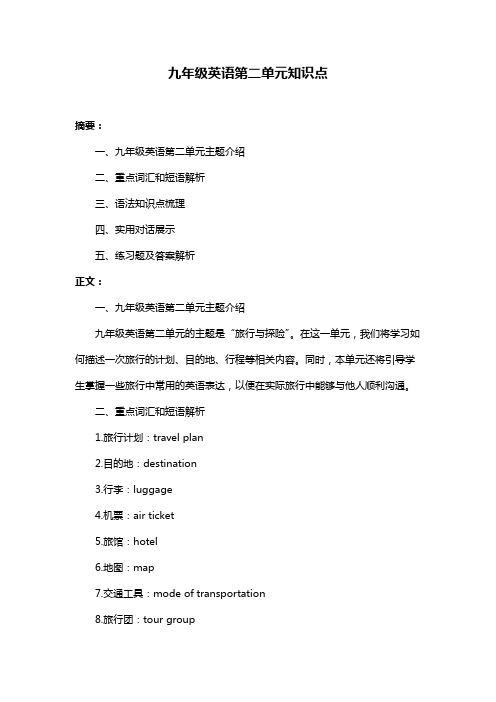
九年级英语第二单元知识点摘要:一、九年级英语第二单元主题介绍二、重点词汇和短语解析三、语法知识点梳理四、实用对话展示五、练习题及答案解析正文:一、九年级英语第二单元主题介绍九年级英语第二单元的主题是“旅行与探险”。
在这一单元,我们将学习如何描述一次旅行的计划、目的地、行程等相关内容。
同时,本单元还将引导学生掌握一些旅行中常用的英语表达,以便在实际旅行中能够与他人顺利沟通。
二、重点词汇和短语解析1.旅行计划:travel plan2.目的地:destination3.行李:luggage4.机票:air ticket5.旅馆:hotel6.地图:map7.交通工具:mode of transportation8.旅行团:tour group9.旅行社:travel agency三、语法知识点梳理1.现在进行时:用于描述现阶段正在进行的动作,如:I am having a wonderful time.(我正在玩得很开心。
)2.一般现在时:用于描述经常发生的动作或事实,如:I travel to different places every year.(我每年去不同的地方旅行。
)3.一般过去时:用于描述过去发生的动作,如:I went to Paris last year.(我去年去了巴黎。
)4.将来时:用于描述将来发生的动作,如:I will go to Japan next year.(我明年要去日本。
)四、实用对话展示对话一:A:Have you ever been to Disneyland?B:Yes, I have.I went there with my family last year.对话二:A:What"s your favorite destination?B:My favorite destination is Hawaii.I love the beautiful beaches and warm weather there.五、练习题及答案解析1.选择题:What did you do last weekend?A.I went to the library.B.I am going to the park.C.I went to the park.答案:C2.填空题:Please fill in the blank with the appropriate form of the verb in the past tense.They _(离开)home yesterday.答案:left3.翻译题:Please translate the following sentence into English.他们正在参观故宫。
- 1、下载文档前请自行甄别文档内容的完整性,平台不提供额外的编辑、内容补充、找答案等附加服务。
- 2、"仅部分预览"的文档,不可在线预览部分如存在完整性等问题,可反馈申请退款(可完整预览的文档不适用该条件!)。
- 3、如文档侵犯您的权益,请联系客服反馈,我们会尽快为您处理(人工客服工作时间:9:00-18:30)。
九年级英语第二单元英语知识点总结
Unit 2 I think that mooncakes are delicious!
在书中找到相应的语句并写在短语的后面
一、重点短语
1.What a great day! 多么好的一天!P9
2.be crowded with 挤满P9
3.eat out 出去吃饭P10
4.put on 增加体重P10
5.be going to 将要做…P10
6.from…to…从…到…P10
7.be similar to…与…相似P10
8.throw at 向…扔去P10
9.wash away 冲走P10
10.have a good luck 祝好运P10
11.in the shape of 以…形状P11
12.shot down 射落P11
13.plan to do 计划做某事P11
14.try to do 努力做某事P11
15.refuse to do 拒绝做某事P11
16.fly up飞向P11
17.call out 出动;召集;大声呼喊P11
y out 摆开;布置P11
19.share …with 与…分享P11
20.as a result 结果P11
21.dress up as 盛装打扮成P13
22.haunted house 鬼屋P13
23.trick or treat 不招待就使坏P13
24.ask for 要求P13
25.play a trick on sb 对某人恶作剧P13
26.think of 想到P14
27.care about 关心P14
28.make money 赚钱P14
ed to do 过去曾经P14
30.warn sb to so sth 警告某人做某事P14
31.end up 最终成为P14
32.expect to do 期待做某事P14
33.remind of 提醒P14
34.take sb to do 带某人去做某事P14
35.wake up 醒来P14
36.find out 发现;找出P14
37.decide to do 决定做某事P14
38.promise to do sth 承诺做某事P14
39.in need 需要P14
40.treat sb with 用…招待某人P14
41.the beginning of …的开始P16
42.give birth to 生(孩子)P16
43.spread…around P16
44.give out 分发P16
二、重点句型
1.what a\an + adj.+ n.+主语+谓语!
2.how + adj.+主语+谓语!
3.whether\if 引起的宾语从句
4.have\has been doing 现在完成进行时
5.so…that…句型
6.one…, the other….
7.more and more +adj. 比较级+比较级
8.it is + adj. + for sb. + to do sth.
not only …,but also…
9.。
